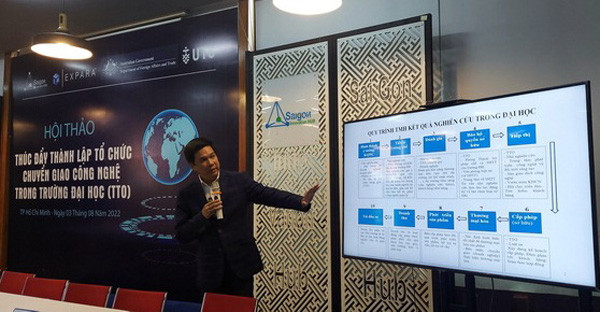and transfer thanks to its highly qualified experts and intellectuals with rich experiences in this field, especially young and talented human resources at universities.

Tuoc said that at a recent workshop in HCM City on promoting the establishment of technology transfer offices (TTOs) in universities, which was co-organised by SiHub, Australia's University of Technology Sydney (UTS) and Singapore's leading incubator fund Expara.
The workshop attracted a large number of domestic and foreign experts, and representatives of universities in the southern provinces and cities to exchange, discuss and assess the current situation, advantages, difficulties and challenges as well as propose effective models and solutions that bring practical benefits from the establishment of technology transfer offices at universities.
Over the past 50 years, Vietnam has focused its resources on training and research, but has not developed commercialisation of research and inventions.
SiHub now has about 300,000 technology research projects at universities nationwide and a network of 100,000 technology firms based around the world, Tuoc said.
“The commercialisation of the universities’ inventions and products in the country is expected to be developed in the future”, he said.
The centre focuses on promoting the development of existing potential in technology development at universities, he said.
It is choosing universities to consult, build processes and organise apparatus to establish technology transfer in order to commercialise research and invention that bring economic value.
Douglas Abrams, founder and CEO of Expara, said Vietnam has great potential for high quality human resources and entrepreneurial spirit that can make significant contributions to the country's technology development.
Intellectual assets from universities and research institutes are the foundation to support start-ups, he said.
“The role of universities is to connect potential ideas, build strong teams, and interact with businesses to successfully conduct commercialisation,” he said.
Nguyen Diep from UTS said the university’s technology transfer model is being deployed to many partners.
“The number of inventions of universities in Vietnam is still very low compared to universities in Thailand and Singapore, but they have a lot of potential,” he said.
Experts pointed out many challenges of technology transfer and commercialisation such as the science and technology ecosystem does not have a clear orientation, with low connectivity and interaction.
They agreed that local universities need to be more active in participating in technology transfer activities, promote both quantity and quality of inventions, and build a technology transfer ecosystem with the participation of businesses.
It also needs to enhance the legal framework, develop technical and financial infrastructure, and promote creativity and innovation capacity, capacity in management and investment in universities, they said.
Many successful models of commercialising university research were introduced at the workshop, such as TTO of TNG Holdings Vietnam and the Sai Gon High-Tech Park's High-tech Business Incubation Centre.
On this occasion, SiHub, UTS, Expara and universities in the southern region signed cooperation agreements to promote technology transfer activities in the following years.
Building smart schools
Recently, a workshop on application of technology in building smart schools for promoting smart city development was held by the Sai Gon High-Tech Park's High-tech Business Incubation Centre, the city’s Department of Science and Technology’s Centre for Statistics and Science and Technology Information, and TitKul Joint Stock Company.
Experts in education and training and information technology enterprises attended the workshop to assess the current situation, and discuss the needs and solutions of information technology application in order to serve the management and administration in the education and training sector adapting to the digital transformation trend.
A recent survey shows that the need for digital transformation in the education and training sector is increasing, especially at schools after experiencing online work due to the COVID-19 pandemic, said Nguyen Duc Tuan, acting director of the Centre for Statistics and Science and Technology Information.
Basically, digital transformation in education and training is the application of technology to optimise management solutions, administration, and teaching methods.
Applying technology in the classroom will create a flexible educational environment and unlimited access to learning materials, increase interactivity and practical experience, improve the quality of education, and reduce training costs, he said.
“The application of technology in building smart classrooms and schools also helps to build a modern and effective education and training sector based on digital technology platforms,” he said.
Le Thi Thao, principal of Cat Lai Secondary School in Thu Duc City, highly appreciated the digital transformation in the education and training sector.
“The use of AI robots has made it easier and faster to check and control the pandemic,” she said.
To build a smart school, since 2017 the school has equipped smart devices such as smart TVs and projectors, and improved internet connection for easy access by students in class and teachers getting materials from shared data, she said.
Titkul JSC introduced its TK Smart Vision Edu app at the workshop which helps schools to monitor, manage, and connect students, teachers, and school staff effectively, easily, and save more time with just a single system.
In particular, its TK Robot AI can recognise faces even when wearing a mask, and automatically measure body temperature and spray hand sanitiser for non-contact students.
Trinh Minh Tri, sales director of Titkul JSC, said these applications could help the schools to integrate the use of smart cards in libraries, school medical rooms, canteens and parking lots when they are further developed.
Many solutions by artificial intelligence and data synthesis, processing and analysis for teaching and learning activities were among issues discussed at the workshop.
Cooperation agreements were signed between schools and businesses to apply technology in building smart schools.
Source: Vietnam News